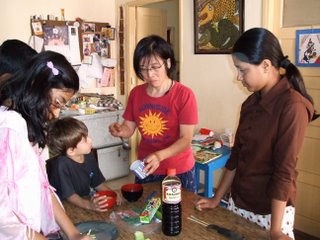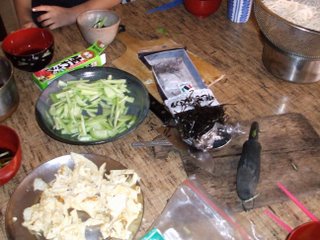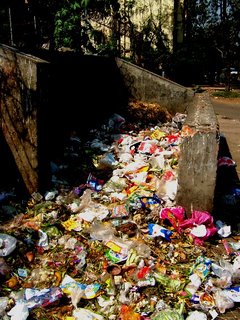
By Momo
Today at Mustard Seeds Library, we were blessed with a visit from Noriko Takemura who is visiting from Kyoto, Japan for about one month. We, the members of Mustard Seeds Library got the first-hand chance to learn how to prepare 'Soumen,' or Japanese noodles eaten in the summer with a Japanese person. We also learned how to use chopsticks, the traditional Japanese tableware...some of us were more successful than others on this front!
Q: So, how do we prepare Soumen, Noriko-san?
A: For the soup, boil the water, add the konbu powder (konbu is a thick seaweed that is used to extract flavor), soy sauce, sugar and salt to taste and let cool down. We make the soup quite strong because the noodles are a bit watery when we dip them in.
For the soumen noodles, first boil the water and put in the soumen bunches til they become soft. Drain off the hot water and let it cool down. You can also serve the noodles over ice but we didn't do that today.
We garnish the noodles with cucumber cut into very thin slices, omelette that has been rolled up and cut into thin strips (this was flavored with a bit of the clear soup and sugar), and 'nori,' which is another kind of seaweed that comes in sheets and sort of resembles thin film. The seaweed is cut up into small paper strips. 'Wasabi,' a horseradish-like root that is grated and served on the side of many Japanese dishes can also be eaten with the soumen.
Q: Where does one find these Japanese ingredients?
A: I don't think things like soumen noodles, nori, wasabi and dashi for the soup are readily available in India so Maura Aunty and I brought them back with us for today from Japan.
Q: Any particular reason to visit India?
A: Yes, I wanted to learn about the culture and also learn the languages and to learn cooking Indian dishes.
Q: How do you like India so far?
A: I like the friendly people, the clothes, the weather!
And now, let's ask some of the Mustard Seeds members to comment on their experience making and more importantly, eating SOUMEN WITH NORIKO??
Prerona: "It was super duper and I liked it very much."
Srijata: "Bettern than I thought!"
Takai: "Oishikatta!" (That means 'it was delicious' in Japanese, by the way)
Mauraunty: "Hey! Let's eat soumen every day!"
Bapi: "It was delicious."
Momo: "Soup-er and good for the first time!"
Bapu: "I love putting the nori seaweed in -- I put in too much!"
Thanks so much to Noriko-san for doing this presentation. Everyone who attended got to try something uniqu



